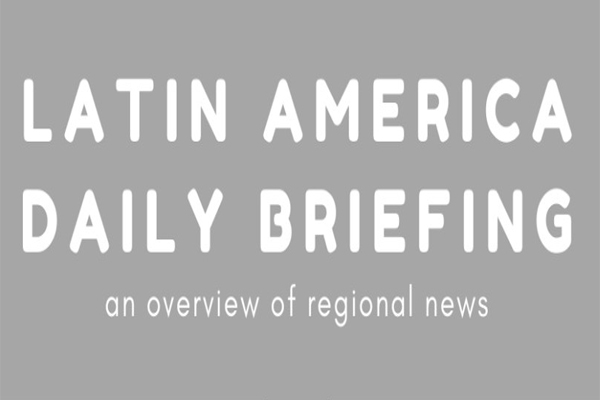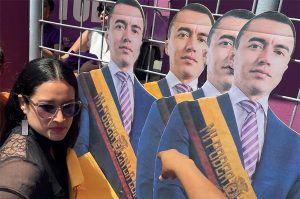
A Brazilian Supreme Court judge rejected a complaint filed by President Jair Bolsonaro in which he accused another justice of abusing his authority, the latest in an ongoing battle between Brazil’s executive and judicial branches ahead of October’s presidential elections.
Bolsonaro filed a complaint arguing that Supreme Court Justice Alexandre de Moraes is slow-walking an investigation to determine whether a group of Bolsonaro allies are running a social media network aimed at spreading threats and fake news against Supreme Court justices. He said the pace is aimed at hurting his standing in an electoral year. Supreme Court Justice Dias Toffoli denied the request, arguing that the facts described “do not bring evidence, even minimal,” of a crime. (Associated Press)
Bolsonaro and associates have continued to cast doubt on the integrity of the elections, particularly the country’s long-established electronic voting system. His son, Senator Flavio Bolsonaro, said that a loss in Bolsonaro’s reelection bid would not be credible, and castigated the country’s electoral court for rejecting military suggestions to improve transparency. Earlier this month, the Supreme Electoral Tribunal (TSE) said several of the suggestions were already in practice, reports Folha de S. Paulo.
Indeed, it is Brazil’s democracy and the independence of its judiciary are under threat from Bolsonaro’s government, according to a group of 80 lawyers and legal experts, who yesterday appealed to the UN Special Rapporteur on the independence of judges and lawyers, Diego Garcia-Sayan, to visit Brazil and report on attacks on the Supreme Court and the TSE. (Al Jazeera)
In a speech today, de Moraes said that the TSE currently has the same desire for democracy and the same courage to face those who do not believe in the democratic regime that it had when it was created 90 years ago. (Reuters)
More Brazil
- Bolsonaro — along with unlikely allies Google and Facebook — successfully postponed in Congress an omnibus bill that would establish moderation and transparency requirements for the internet platforms and payment for news content. Which means the so-called Fake News Bill is unlikely to enter into play before October’s elections, writes Patricia Campos Mello at Poynter. “Bolsonaro will likely head into the 2022 presidential campaign without any risk of restrictions on Telegram, WhatsApp and the social media platforms he uses to spread the Brazilian version of “Stop the Steal.””
News Briefs
Regional
- Covid-19 cases in the Americas surged 27.2 percent last week over the prior one. Central America saw the largest percentage rise in cases, with infections soaring by 80%. The Pan American Health Organization warned that Covid is on the rise again in the region as many countries have abandoned measures like masking and social distancing and many lag in vaccination rates. (Reuters)
- Experts who track Conti — the Russia-based ransomware gang that has held Costa Rica’s tax collection and export systems hostage for over a month — said the group had recently begun to shift its focus from the United States and Europe to countries in Central and South America, perhaps to retaliate against nations that have supported Ukraine, reports the New York Times.
Regional Relations
- Venezuelan President Nicolás Maduro has found an unlikely political lifeline thanks to geopolitical shifts caused by Russia’s invasion of Ukraine and Venezuelan political deadlock, which prompted a major policy rethink from the U.S. Biden administration, reports the Guardian. (See yesterday’s post.)
- Mexican Foreign Minister Marcelo Ebrard said the country hopes to receive a response today or tomorrow regarding Mexico’s proposal for all countries in the region to attend the Summit of the Americas, reports Reuters. A growing number of Latin American leaders have said they would not attend the conference or not attend if all countries in the region were not invited.
- U.S. President Joe Biden’s new Cuba measures “appear driven by the confluence of the migration crisis and Latin America’s rebellion over U.S. Cuba policies,” writes William LeoGrande in World Politics Review. (See Tuesday’s post and yesterday’s.)
- The growing chorus of regional dissent regarding the U.S. decision to likely exclude Cuba from the Summit of the Americas is nothing new. “Obama’s 2014 decision to normalize relations was heavily influenced by the public scolding he received from Latin American heads of state at the Sixth Summit of the Americas in 2012. Even close U.S. allies warned that unless Cuba was invited to the 2015 summit, they would not attend.” (World Politics Review)
- U.S. First Lady Jill Biden is embarking on a high-stakes, six-day diplomatic tour of three Latin American countries: Panama, Ecuador and Costa Rica. (Washington Post)
Haiti
- Haitian Prime Minister Ariel Henry resumed negotiations with the opposition coalition, the “Montana Accord,” which favors the creation of a transition government to bridge the gap between the Henry government and a government to eventually be democratically elected. Negotiations between the Haitian government and the group had been on hold since February 14, reports the Latin America Risk Report.
Chile
- Chile’s congress voted to approve a 14.3 percent increase in the minimum wage yesterday, as the country struggles with soaring inflation, reports Reuters.
Guatemala
- Guatemala’s congress approved a $500 million loan from the World Bank that the government has said will be used to pay down debt, freeing up funds for social spending, reports Reuters.
El Salvador
- El Salvador’s big bet on bitcoin has closed some potential off-ramps from a current fiscal crisis that includes an upcoming major debt repayment, reports Reuters.
Argentina
- Argentina carried out its postponed 2020 Census yesterday. Infobae reports on the adventure of reaching one of the country’s most remote inhabitants. (Infobae)
Latin America Daily Briefing —
http://latinamericadailybriefing.blogspot.com










